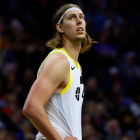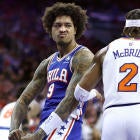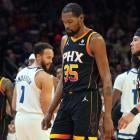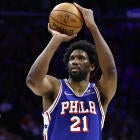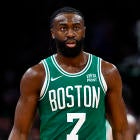
Why did the Toronto Raptors trade for Kelly Olynyk on Thursday? He's turning 33 in April, he'll be a free agent in the summer and they surrendered a first-round pick in the deal. Leading up to Thursday's trade deadline, rumors and reporting suggested that contenders were interested in Olynyk, but the Raptors are definitively not a contender -- they're 3-12 in their last 15 games, and they're 18-33 on the season. Have they lost their minds? Is this because Olynyk is Canadian?
I say no to both. Sure, it's strange that a rebuilding team actively wanted to acquire a veteran who can walk in a few months. But it's not strange at all that a rebuilding team actively wanted this veteran who can walk in a few months.
The Utah Jazz acquired Olynyk from the Detroit Pistons in September 2022, and his name has been in the rumor mill ever since. Going into last season, the Jazz were expected to be a complete mess, having traded away their two stars (and a couple of other veterans) for what seemed like spare parts. Instead, they were an unselfish, more-than-the-sum-of-their-parts team, at least until the front office traded a few of those parts 364 days ago.
It was somewhat surprising that Olynyk was not among those traded when Mike Conley, Jarred Vanderbilt, Malik Beasley and Nickeil Alexander-Walker left Salt Lake City last February. The Jazz chose to keep him around, though, and, after a rough start to this season, Olynyk has been instrumental in them turning things around -- once again, they are an unselfish, more-than-the-sum-of-their-parts team.
Before a recent game, Jazz coach Will Hardy said, "Kelly does a lot of things for us. He's a pass-first player, great facilitator. He's somebody that we use to settle us down at times, in terms of helping us play some action off the ball when I think we're dribbling too much. Kelly can space the floor, shoot, he can post against smalls." And if that had been all Hardy said, it would have been a pretty nice encapsulation of his value: Olynyk is a versatile, smart player, and, because he likes to facilitate for others, he can nudge a team in the direction of playing the right way.
only ko knows 😏#TakeNote | @kellyolynyk pic.twitter.com/kAHf0lYtzz
— Utah Jazz (@utahjazz) January 13, 2024
But that doesn't quite capture the essential weirdness of Olynyk's game. He is a funky player, a 6-foot-11 veteran who isn't great at doing some of the things NBA big men are typically tasked with -- rim protection, defensive rebounding -- but he is awesome at doing many of the things typically associated with guards.
So Hardy continued: "I think if you ask Kelly, he would describe himself as a guard. I don't think that he thinks of himself as a big. Which has its good moments and its bad moments. But he's a Swiss Army knife for us."
Coaching Olynyk can be kind of complicated. "Sometimes it's a little distracting because I don't necessarily know quite what to do with Kelly because there's a lot of options," Hardy said. "It's a good distraction, it's a good luxury to have. But there's plenty of games where I look back at the film and I'll wish I had done something different with Kelly than I did because he has so many things to offer."
To get the most out of Olynyk, you have to involve him in the offense. He doesn't need to take a ton of shots or have plays run for him -- his 15.3% usage rate this season is the lowest of his career -- but using him as simply a stretch 5 is a waste.
"I have to let him be himself," Hardy said. "Kelly's an artist. He has a creative brain. He does some things maybe not exactly how the book would say they should be done, but Kelly's a heck of a player. And I know for a fact that he is always a net positive on our team in terms of how he engenders ball movement and just the general sentiment of playing as a group."
Hardy spent 90 seconds explaining what Olynyk does for the team, and then the team got on the court at Barclays Center and got absolutely annihilated by the Brooklyn Nets. Even in a 147-114 loss, though, you could see what Hardy was talking about. In a 60-second stretch in the second quarter, Olynyk gifted his teammates easy points on three consecutive possessions with pinpoint passes from the perimeter:
Olynyk has the skill set to fit into any halfcourt offense, but Toronto's is a particularly nice fit. Coach Darko Rajakovic has the Raptors passing much more than they have in recent years, and Olynyk's presence will encourage them to cut into open space. His shooting should make the Immanuel Quickley-Scottie Barnes pick-and-roll pop more, especially when Olynyk is the nominal 5. It also allows him to complement Jakob Poeltl at the 4 spot.
One way to explain the acquisition, which also brought second-year wing Ochai Agbaji to Toronto and sent a 2024 first-round pick to Utah along with guard Kira Lewis Jr. and forward Otto Porter, is that the Raptors saw it as a good value proposition: Agbaji has upside, they were overstuffed with firsts in a weak draft and Olynyk is way more productive than people realize -- this season Olynyk is averaging only 20.4 minutes, but his numbers (14.3 points, 9.0 rebounds, 7.7 assists per 36 minutes on .562/.429/.842 shooting splits with a 67.7% true shooting percentage) are nuts.
I'd argue, though, that Hardy's 90-second love letter more effectively explains it than the stats do. Olynyk has spent the last couple of years on a rebuilding team, helping an odd mishmash of players cohere into a genuinely fun group that moves the ball, makes quick decisions and overachieves. I'll bet Toronto would like to be that type of team, too.













